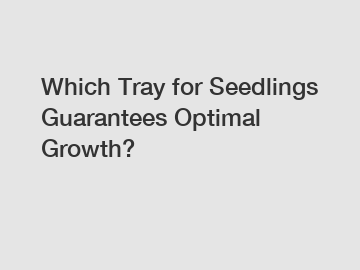Jan. 09, 2024
Home & Garden
Which Tray for Seedlings Guarantees Optimal Growth?
Starting a garden from seedlings is an exciting and rewarding experience for any gardener. However, to ensure the best chance of success, it is important to choose the right tray for your seedlings. With so many options available on the market, it can be overwhelming to determine which tray will provide optimal growth for your plants. In this article, we will explore the different types of seedling trays and discuss their advantages and disadvantages.
1. Plastic Seedling Trays.

Plastic seedling trays are commonly used by both amateur and professional gardeners. These trays are lightweight, durable, and come in various sizes and cell configurations. The cells in plastic trays have good insulation properties, helping to maintain ideal soil temperature and moisture levels, which are crucial for seed germination.
Pros:
- Affordability: Plastic trays are relatively inexpensive and widely available.
- Reusability: They can be reused for multiple growing seasons, making them a cost-effective option.
- Flexibility: Trays with removable cells allow for easy transplanting without disturbing the delicate roots.
Cons:
- Drainage: Some plastic trays may have poor drainage systems, leading to waterlogging and root rot if not managed properly.
- Limited root development: The confined space in each cell may restrict root growth, which can affect the overall health and vigor of the plant.
2. Biodegradable Seedling Trays.
Biodegradable seedling trays are an eco-friendly alternative to plastic trays. Made from materials such as peat, coco coir, or compressed cow manure, these trays break down naturally over time, eliminating the need for transplanting. They can be directly planted into the soil, reducing the risk of transplant shock.
Pros:
- Environmental friendliness: Biodegradable trays reduce plastic waste and have a smaller carbon footprint.
- Root development: The porous nature of these trays allows roots to penetrate easily, promoting stronger and healthier plants.
- Moisture retention: They retain moisture well, ensuring adequate hydration for seedlings.
Cons:
- Cost: Biodegradable trays tend to be more expensive than plastic trays due to the manufacturing process and the materials used.
- Durability: These trays can degrade quickly if not handled carefully, potentially risking damage to the delicate seedlings.
3. Styrofoam Seedling Trays.
Styrofoam seedling trays are lightweight and easy to clean, making them a popular choice for commercial nurseries. The cells in these trays are large and spacious, allowing for ample root growth. However, they may not be the best option for home gardeners due to their environmental impact.
Pros:
- Root development: With spacious cells, styrofoam trays promote healthy root development.
- Reusability: Styrofoam trays are durable and can be reused for several seasons.
- Insulation: They provide good insulation, maintaining consistent soil temperature for optimal growth.
Cons:
- Environmental impact: Styrofoam is derived from non-renewable resources and takes a significant amount of time to degrade, posing a risk to the environment.
- Limited availability: Styrofoam trays may not be readily available in local gardening stores.
In conclusion, selecting the right tray for your seedlings plays a vital role in their growth and development. Plastic trays are an affordable and versatile option, while biodegradable trays offer an eco-friendly solution with enhanced root development. Styrofoam trays may be suitable for larger-scale nurseries, but their environmental impact limits their suitability for individual gardeners.
If you need further guidance or have any questions about which tray to choose for your seedlings, feel free to contact us. We are here to help you make the best decision for your gardening needs.
Contact us to discuss your requirements of Wholesale Shallow Trays for Microgreens, plug trays for seedlings, Plant seedling trays with transparent lids. Our experienced sales team can help you identify the options that best suit your needs.
If you are interested in sending in a Guest Blogger Submission,welcome to write for us!
All Comments ( 0 )